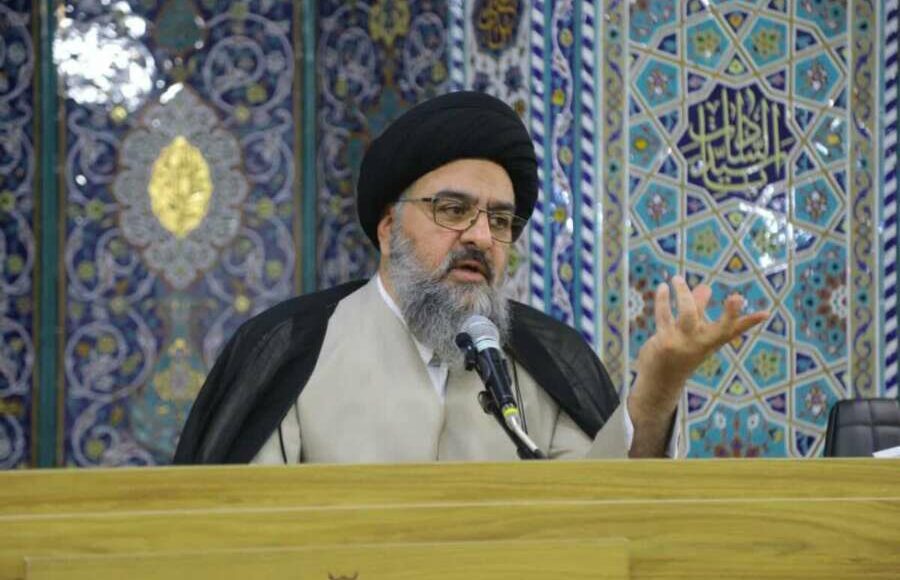Ayatullah Sayyid Mujtaba Nur Mufidi: Efficient Jurisprudence Requires Time, Place, and Governance
Explaining Imam Khomeini’s School on the Anniversary of His Demise
Ayatullah Nur Mufidi on Jurisprudence and Governance
Ayatullah Sayyid Mujtaba Nur Mufidi, speaking at the twenty-second session of “Explaining the School of Imam Khomeini (RA)” titled “Imam Khomeini (RA), the Progressive and Leading Seminary and the Requirements of Efficient Jurisprudence,” highlighted key principles. Specifically, he emphasized the comprehensiveness of religion, the role of governance, the influence of time and place in ijtihad, and the need for forward-thinking to address societal needs effectively.
Event Overview
On Tuesday, 6 Khordad 1404, the Institute for Compilation and Publication of Imam Khomeini (RA)’s Works, Qom Office, hosted this session at the Imam (RA) Memorial Complex in Qom. Ayatullah Nur Mufidi, a professor of advanced courses in the Qom Seminary, delivered the keynote address. The event, attended by scholars and enthusiasts, coincided with the anniversary of Imam Khomeini’s demise.
Ayatullah Nur Mufidi began by thanking the organizers and underscoring the importance of explaining Imam Khomeini’s school, particularly during this period. He referenced the Supreme Leader’s recent message, noting, “It serves as an updated and complementary framework to Imam Khomeini’s vision for an ideal seminary.”
Five Pillars of a Progressive Seminary
Ayatullah Nur Mufidi outlined five foundational principles for a progressive and leading seminary:
- Self-Purification and Divine Piety He identified self-purification and divine piety as the cornerstone of seminary growth. Without ethical commitment and self-building, efforts fail to achieve their ultimate goal: training divine individuals to guide society.
- Comprehensiveness of the Seminary Both Imam Khomeini and the Supreme Leader have stressed this principle. The late Imam stated, “Scholars must embody diverse dimensions, reflecting the multifaceted nature of Islam and humanity.” Similarly, the Supreme Leader described the seminary as an outward-looking institution. Its output serves society’s intellectual, cultural, social, and political needs. Thus, it transcends mere teaching, encompassing knowledge, education, and societal functions.
- Jihadist Identity Ayatullah Nur Mufidi emphasized a jihadist identity, characterized by rejecting domination systems and combating global oppressors. This identity defines a progressive seminary’s role in societal leadership.
- Support for the Deprived He highlighted the importance of accompanying the people and supporting the deprived. This positions the seminary and clergy as defenders of justice, particularly for marginalized communities, in the fight against oppression.
- Governmental and Social Perspective A forward-thinking seminary must adopt a governmental and social outlook. This enables jurisprudence to offer large-scale solutions for societal administration, aligning with practical governance needs.
Key Themes from the Supreme Leader’s Message
Ayatullah Nur Mufidi addressed two critical points from the Supreme Leader’s recent message:
- Participation in Societal Systems: Seminaries must contribute to developing and explaining systems for administering society.
- Civilizational Innovations: These should align with Islam’s global message, fostering progress within a universal framework.
He presented these pillars as a vision for an ideal seminary, rooted in Imam Khomeini’s authentic religious principles and updated by the Supreme Leader to meet future societal needs.
Addressing the Seminary’s Current State
Referencing Imam Khomeini, Ayatullah Nur Mufidi noted, “The clergy cannot understand that conventional ijtihad is insufficient for societal administration without active engagement in all issues.” He also cited the Supreme Leader’s observation of a “mismatch between promotional outputs and the intellectual and cultural realities of people, especially youth.” This gap, he acknowledged, is an undeniable reality.
Defining Efficient Jurisprudence
Ayatullah Nur Mufidi defined efficient jurisprudence as “the ability of jurisprudence to achieve its goals.” To assess this efficiency, he stressed, goals must be clearly defined. Rejecting the notion that religion addresses only otherworldly matters, he emphasized Imam Khomeini’s comprehensive view. For the Imam, jurisprudence provides a complete program for human life, from birth to death, ensuring the growth and progress of nations.
Four Requirements for Efficient Jurisprudence
Ayatullah Nur Mufidi outlined four essential conditions for achieving efficient jurisprudence in a progressive seminary:
- Comprehensive Understanding of Islam and Jurisprudence A holistic view of religion, addressing both worldly and otherworldly needs, is critical. This ensures jurisprudence remains relevant to all aspects of human life.
- Role of Governance He emphasized that jurisprudence cannot be efficient without governance. Quoting Imam Khomeini, he stated, “Governance for the jurist is the practical philosophy of all jurisprudence.” Belief in religious government and the guardianship of the jurist is thus essential.
- Consideration of Time and Place Recognizing temporal and spatial conditions is vital for deducing jurisprudential rulings. This approach, emphasized by Imam Khomeini in his later years, enables jurists to provide precise, up-to-date solutions for social and governmental challenges, surpassing traditional ijtihad.
- Forward-Thinking Drawing on Imam Khomeini’s words, Ayatullah Nur Mufidi stressed that seminaries must anticipate society’s future needs and stay ahead of events. Jurisprudence and seminaries should be prepared to address emerging issues through planning and foresight.
Conclusion and Future Aspirations
Ayatullah Nur Mufidi concluded by revisiting the Supreme Leader’s points on societal systems and civilizational innovations. He emphasized the need for a macro, comprehensive, and systematic approach to jurisprudence, ensuring internal coherence. He expressed hope that ongoing scientific efforts in seminaries would lead to a progressive, leading, and standard seminary, achieving true jurisprudential efficiency.
